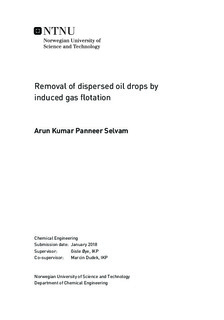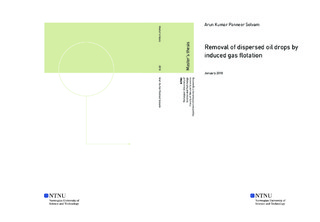| dc.description.abstract | Produced water is an important byproduct of oil and gas production. With increasing number of maturing reservoirs, global oil to water cut is in the ratio of 1:3. Treatment of produced water is essential due to its detrimental effects on the environment and marine life. Gas flotation is identified as effective secondary treatment method for treating produced water. Induced gas flotation is the widely used gas flotation method due to its low retention time and high separation efficiency.
Synthetic produced water was prepared using three different crude oils. Experiments were carried out for gravity and gas flotation by varying different brine solutions, pH, mixing speed and initial oil concentrations. Influence of parameters like bubble sizes and type of gas used for flotation was also conducted for gas flotation. The objective of the thesis is to identify major influential parameters affecting the separation process. Droplet sizes were measured before and after separation process using gravity or gas flotation methods. Oil removal efficiency for the samples were calculated and the influence of the parameters were discussed in detail. It was found that the oil removal efficiency of gravity separation and gas flotation ranged from, 29-65% and 54-96% respectively. The type of crude used was identified as the major influencing factor for separation. | |

